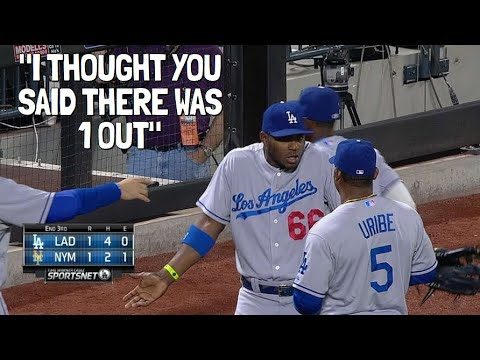
Title: Resolving Discord on the Diamond: Navigating Disagreements in Baseball Games
Introduction: Baseball, often hailed as America’s favorite pastime, is not immune to the occasional clash of opinions. Amidst the crack of the bat and the roar of the crowd, disagreements can arise, testing the resolve and sportsmanship of players and coaches alike. In this article, we delve into the art of dealing with disagreements in baseball games, exploring effective communication strategies, the role of umpires, and the importance of maintaining a harmonious atmosphere on the diamond. Whether you’re a player, coach, or a fervent fan, join us as we uncover the secrets to resolving conflicts and fostering a spirit of fair play in America’s beloved game.
How can sports team drama be prevented?
Paragraph 1:
Put an end to sports team drama by establishing clear standards from the start. According to expert Kyba, a significant amount of conflicts in teams arise when athletes feel resentful for not being chosen for the starting lineup or other privileges. By setting and consistently enforcing transparent guidelines at the beginning of the season, athletes will have a clear understanding of why they are or aren’t receiving certain opportunities. This proactive approach will minimize confusion and foster a more harmonious team environment.
Paragraph 2:
To effectively address sports team drama, it is crucial to establish and maintain clear standards. Athletes often experience conflicts and resentment when they feel unfairly treated, such as being excluded from the starting lineup. Expert Kyba suggests that by setting unambiguous expectations and consistently adhering to them, athletes will have fewer reasons to feel confused or resentful. By providing clarity and consistency, teams can prevent unnecessary drama and create a positive atmosphere where athletes can focus on their performance and collective success.
How can a team be effectively coached when there is drama present?
When coaching a team with drama, it is essential to create a safe and supportive space for dialogue. By doing so, team members can openly express their concerns and address any underlying issues, fostering trust and respect among them. Additionally, it is crucial to remember that coaching is an ongoing process. It is unrealistic to expect the elimination of the drama triangle overnight. Changing entrenched behaviors and patterns takes time and effort, but with consistent coaching and commitment, a drama-free team environment can be achieved.
How do athletes resolve conflict in sport?
In order to effectively resolve conflict in sport, athletes must first acknowledge the importance of communication and teamwork. By openly expressing their concerns and actively listening to one another, athletes can foster a supportive and inclusive environment. Additionally, implementing conflict resolution strategies such as compromise, mediation, and problem-solving can help athletes find common ground and reach mutually beneficial solutions. Ultimately, by prioritizing effective communication and adopting a collaborative mindset, athletes can navigate conflicts in sport and promote a positive and harmonious team dynamic.
Unlocking Victory: Proven Strategies for Resolving Baseball Disagreements
Unlocking Victory: Proven Strategies for Resolving Baseball Disagreements
In the world of baseball, disagreements can often arise, threatening to derail a team’s path to victory. However, with the right strategies in place, these conflicts can be resolved effectively, allowing the team to unlock their full potential and achieve success on the field. Communication is key when it comes to resolving baseball disagreements, as open and honest dialogue fosters understanding and collaboration. By encouraging players, coaches, and staff members to express their concerns and perspectives in a respectful manner, teams can navigate conflicts and find common ground. Additionally, implementing a fair and unbiased decision-making process ensures that everyone feels heard and valued. This not only resolves disagreements but also strengthens team dynamics and cultivates a culture of trust and unity. When conflicts are addressed promptly and constructively, they become opportunities for growth and improvement, propelling the team towards victory.
Stepping Up to the Plate: Mastering Conflict Resolution in Baseball
Stepping Up to the Plate: Mastering Conflict Resolution in Baseball
In the high-stakes world of baseball, conflict resolution is a critical skill that separates the champions from the rest. As players step up to the plate, they not only face the pressure of hitting a home run but also the challenges of navigating conflicts with teammates, coaches, and opponents. Mastering conflict resolution in baseball requires a delicate balance of communication, teamwork, and emotional intelligence. Players must learn to listen actively, express their concerns respectfully, and collaborate to find mutually beneficial solutions. By embracing conflict as an opportunity for growth and cultivating a culture of open dialogue, teams can build trust and cohesion, ultimately leading to success on and off the field. So, next time you step up to the plate, remember that resolving conflicts is just as important as hitting that game-winning home run.
Home Run Solutions: Winning Strategies for Resolving Baseball Disagreements
Home Run Solutions: Winning Strategies for Resolving Baseball Disagreements
In the world of baseball, disputes are bound to arise, but finding effective resolutions is key to keeping the game on track. With Home Run Solutions, teams can tackle disagreements head-on and come out victorious. Whether it’s a disagreement over a call, a dispute between players, or a conflict between coaches, our strategies are designed to promote fair play, teamwork, and mutual understanding. By fostering open communication, active listening, and a focus on finding common ground, Home Run Solutions helps teams hit a home run in resolving conflicts and keep the game running smoothly.
In the fast-paced world of baseball, where emotions run high and tensions flare, finding common ground amidst disagreements is vital for maintaining sportsmanship and fair play. By fostering open communication, respecting differing opinions, and adhering to established rules, players, coaches, and umpires can work together to ensure that disagreements are resolved swiftly and amicably. Ultimately, the ability to navigate disagreements with grace and professionalism not only enhances the integrity of the game but also sets a positive example for future generations of baseball enthusiasts.
